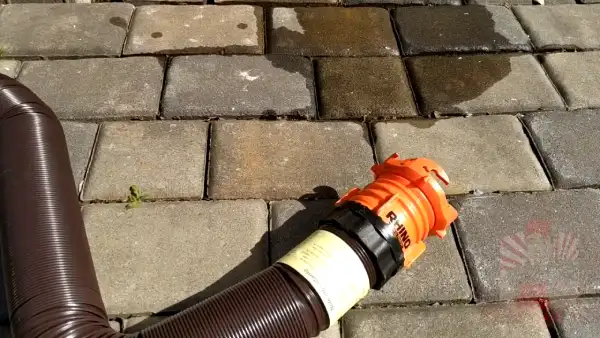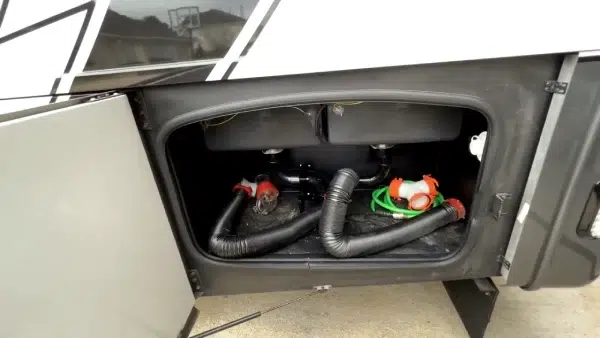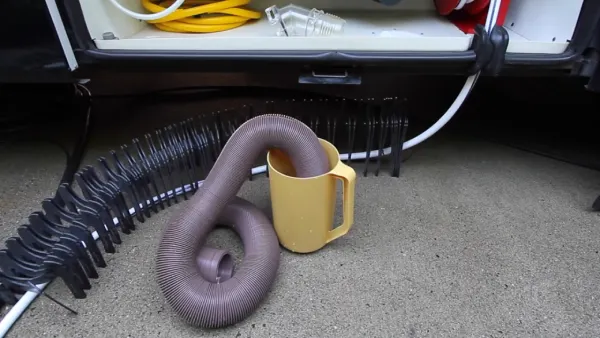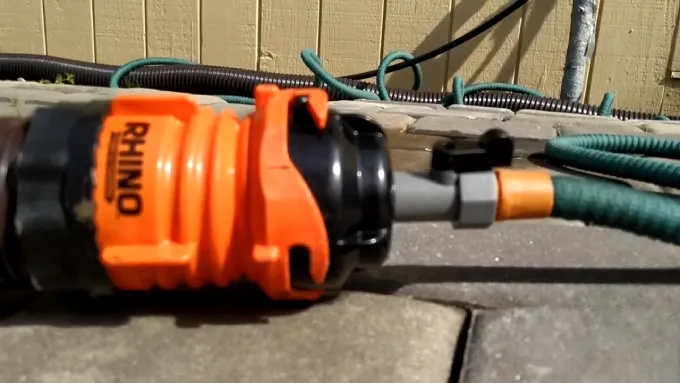Last Updated on April 28, 2023
Keeping your RV sewer hose clean is essential to maintain a healthy and hygienic environment in your recreational vehicle. A dirty sewer hose can lead to unpleasant odors, clogs, and bacterial growth. As a responsible RV owner, knowing how to clean your sewer hose properly is crucial.
After using your sewer hose pipe, rinse it with clean water. For deeper cleaning, you can use a specialized cleaner such as RV Super Cleaner or similar products designed specifically for sewer hoses. You may need to soak your RV sewer hose every two years in bleach to remove more stubborn dirt or residue.
With these simple methods, you can ensure your next RV journey is uninterrupted and worry-free. So let’s start making sure your sewer hose is sparkling clean.
Methods on How to Clean RV Sewer Hose

Cleaning the sewer hose is essential to maintaining your RV’s sewer system. Neglecting to clean the hose can lead to unpleasant odors and potential health hazards. This section will discuss the methods you must take to ensure your RV sewer hose is properly cleaned.
First of all, it’s essential to protect yourself from any potential hazards. This is where gloves and protective gear come in handy. Choosing durable and waterproof gloves is important when selecting gloves for this task. Now you’re ready to begin cleaning your RV sewer hose:
Method 01: Rinsing the Hose with Water
When cleaning your RV sewer hose, one of the most important steps is rinsing the hose with water. This helps remove any remaining waste and debris from the inside of the hose, ensuring it is clean and ready for future use.
To begin this process, you will need access to a source of clean water. This can be a dump station hose or a bucket filled with water.
First, attach the end of your sewer hose to the dump station or bucket.
Next, turn on the water and allow it to flow through the hose for several minutes. You may want to move the hose around or gently shake it to ensure all areas are thoroughly rinsed.
Method 02: Using a Specialized Cleaner
When cleaning your RV sewer hose, a specialized cleaner can effectively ensure it is thoroughly cleaned and sanitized. These cleaners are designed specifically for RV sewer hoses and tanks, making them ideal for maintaining your system.
One popular type of RV sewer hose cleaner is enzyme-based cleaner. These cleaners use natural enzymes to break down waste and bacteria in the tank and hose, leaving them clean and fresh-smelling. Enzyme-based cleaners, including plastic or rubber, are safe for all hoses and tanks.
Another option is chemical-based cleaners, which work by breaking down waste and bacteria through the use of harsh chemicals. While these types of cleaners can be effective, they may also be more damaging to your hoses and tanks over time.
It’s essential to read the labels carefully before using any chemical-based cleaner to ensure it is safe for your specific system.
When using a specialized cleaner, following the manufacturer’s instructions carefully is essential. This may involve adding the cleaner directly into the tank or running it through the hose with water. After using the cleaner, rinse the hose thoroughly with water to remove any remaining residue.
In addition to using a specialized cleaner, there are other steps you can take to maintain your RV sewer system. Regularly emptying and flushing your tanks can help prevent buildup and blockages in your hoses.
It’s also essential to check for leaks or damages regularly, as these issues can cause serious problems if left unaddressed.
Method 03: Soaking the Hose in Bleach Solution
Another effective way to clean your RV sewer hose is by soaking it in a bleach solution. Bleach is known for its powerful cleaning properties, and it can help eliminate any remaining bacteria or odors inside the hose.
To soak your RV sewer hose, you will need to dilute bleach with water. The recommended ratio is one cup of bleach per one gallon of water. Make sure to wear gloves and protective gear when handling bleach.
Once you have diluted the bleach, submerge the entire length of the hose into the solution. Leave it in for at least an hour, preferably overnight. This will give enough time for the bleach solution to penetrate deep into the hose and kill any remaining bacteria or germs.
After soaking, drain the bleach solution from the hose and rinse it thoroughly with clean water. You may also want to use a specialized cleaner or a hose-cleaning brush to remove any debris or buildup that may still be present inside.
It’s important to note that while bleaching your RV sewer hose can effectively sanitize it, overusing bleach can damage the material of your hose over time. So make sure only to use this method sparingly and as needed.
How to store an RV sewer hose after cleaning?

Properly storing your RV sewer hose is just as important as cleaning and maintaining it. A well-stored hose will ensure that it remains in good condition and doesn’t become damaged or contaminated.
The first step to storing your RV sewer hose properly is to drain any excess water from the hose. Doing this thoroughly is essential, as any remaining water can lead to mold or mildew growth. Once the excess water has been drained, you can begin coiling the hose.
When coiling your RV sewer hose, do so carefully and securely. You don’t want any kinks or bends in the hose, which can lead to damage over time. And ensure that the ends of the hose are secured together so that no debris or insects can enter.
After coiling your RV sewer hose, storing it in a designated container is essential. This container should be kept separate from other items in your RV to prevent contamination. Many specialized containers are available on the market specifically designed for storing RV sewer hoses.
How do you clean the outside of your RV sewer hose?
An RV sewer hose’s exterior can easily accumulate dirt, grime, and even harmful bacteria.
To ensure hygiene and cleanliness, it’s important to inspect and clean your RV sewer hose outside regularly. Using a disinfectant spray and wiping the hose down with a clean cloth or paper towel is an effective way to sanitize the hose’s outer surface.
Always thoroughly clean both ends of the hose to prevent any harmful organisms from spreading.
How do you sanitize an RV sewer hose?
Sanitizing your RV sewer hose is critical to maintaining a healthy and safe environment. To sanitize your RV sewer hose, simply empty the contents of the tank and flush it with clean water. Then, mix a sanitizing solution, such as bleach and water, and pour it into the hose.
Let the solution sit in the hose for at least 15 minutes before flushing it out with clean water. Rinse the hose thoroughly and let it air dry before storing it. Sanitizing your RV sewer hose regularly helps prevent harmful bacteria from accumulating in the hose and spreading to other areas.
How do you prevent odors in RV sewer hoses?

Odors in your RV sewer hose can be unpleasant and concerning. To prevent odors from forming, it’s important to keep the hose clean and dry. Flushing the hose with clean water and allowing it to air dry after emptying the tank effectively reduces foul smells.
Also, specialized RV sewer hose deodorizers or essential oils can mask odors. Regularly using a holding tank treatment can help break down waste, keeping the tank and hose clean and odor-free.
How often should you clean your RV sewer hose?
It’s essential to clean your RV sewer hose regularly to prevent the buildup of harmful organisms. Cleaning the hose after every use is recommended, as this ensures that the hose is always clean and sanitary.
But cleaning the hose every few days is also acceptable if you’re camping for an extended period. Maintaining a regularly cleaned and sanitized RV sewer hose is crucial for ensuring a safe and healthy environment for everyone.
Can you use regular household cleaning products to clean your RV sewer hose?
It is not recommended to clean your RV sewer hose with regular household cleaning products due to their harsh chemical properties that can damage the hose. Alternatively, use a specialized RV hose cleaner or mix bleach and water.
These products are safe and designed to keep your RV sewer hose clean and harmful bacteria-free.
Maintain a Clean RV Sewer Hose for Optimal RV Experience and Longevity
Maintaining the cleanliness of your RV sewer hose is an essential responsibility for any RV owner to ensure a pleasant experience and preserve its longevity.
Every time after use, it’s essential to rinse the hose with plenty of water and use specialized cleaner or soak it in bleach to eliminate bacteria and odors that may still linger in the hose.
When storing your RV sewer hose, drain any excess water, coil and secure it properly, and store it in a designated container to prevent potential damage or contamination.
So, establish a regular cleaning schedule and check for leaks and damages regularly to ensure your RV’s sewer system remains clean and functioning correctly. Therefore, care for your RV’s sewer hose and you will also be cared for.



